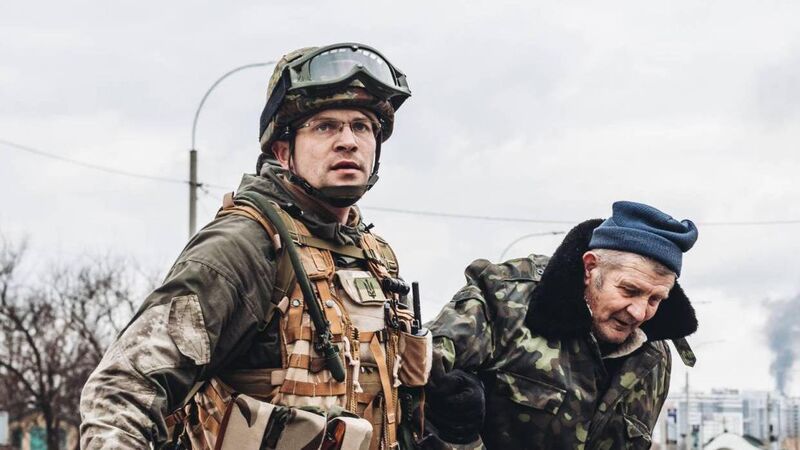The futility of the war as laid out by former Russian paratrooper

A soldier helps an elderly man escape shelling in Irpin, earlier this year.
These are the words of former Russian paratrooper, Pavel Filatyev, aged 34, who in his 141-page memoir published on his VKontakte social media page laid bare the grim reality at the core of the Russian invasion of Ukraine.
Described by in an interview with Filatyev last week as “a bombshell”, the memoir is a day-by-day description of how his paratrooper unit had been sent to mainland Ukraine from Crimea, entered Kherson and captured the port with heavy artillery fire for more than a month.
Filatyev became wounded and was evacuated from the conflict with an eye infection. He said that while sitting under artillery fire, “...I already thought that we’re just out here doing bullshit - what the f*** do we need this war for? And I really had this thought: God, if I survive, then I’ll do everything that I can to stop this.”
Filatyev knew what he was doing could endanger him. In Russia, even the word ‘war’ has been banished in public. But the memoir is slowly getting out with extracts from it published in Russia’s independent press. The former paratrooper is the first soldier known to have fled Russia because of opposition to the war. He has described how his weary and poorly equipped unit stormed into Ukraine in February with very little in terms of concrete objectives. Nor did the men have any idea why the war was taking place.
In the description of the starving paratroopers (the elite of the Russian army) swiping the food and taking computers and any valuable goods they could find in Kherson, he says he and his comrades were pushed into “a wild state.” No thought had been given to the fact that the men needed to sleep, eat and wash.
“Everything around gave us a vile feeling: like wretches we were just trying to survive,” he wrote.
Sucking on cigarettes in a cafe in Moscow, nervously looking around to see if he was spied on, Filatvey told that he realises how savage it will sound to a foreign reader that the soldiers stole computers and other items. But, he added, the soldier knows that a computer is worth more “one of his salaries. And who knows if he’ll be alive tomorrow anyway. So he takes it.” He added that he’s not trying to justify the action “but I think it’s important to say why people act like this, to understand how to stop them.”
Filatvey vented about the ‘degradation’ of the army being made to use dated kit and vehicles that left Russian soldiers exposed to Ukrainian counterattacks.
The frustrations on the frontline resulted in drastic actions. Filatvey wrote about reports of servicemen deliberately shooting themselves in order to get away from the frontline and collect the equivalent of €40,500 in compensation, as well as rumours of acts of mutilation against captured soldiers and corpses.
Filatvey described a culture of anger and resentment in the army that negated the facade of total support for the war as portrayed in Russian propaganda.
“Most people in the army are unhappy about what’s going on there, they’re unhappy about the government and their commanders, they’re unhappy with Putin and his politics, they’re unhappy with the minister of defence, who has never served in the army,” wrote Filatvey.
Since going public, Filatvey said his entire unit had severed contact with him. But he believes that 20% of them supported his protest outright. And a significant number had relayed to him a grudging sense of respect for the patriotism of Ukrainians fighting to defend their own territory, or had complained about mistreatment by Russia of its own soldiers.
Filatvey talks a lot of sense. He said: “They say that the heroism of some is the fault of others. It’s the 21st century, we started this idiotic war, and once again we’re calling on soldiers to carry out heroic deeds, to sacrifice themselves. What’s the problem, are we not dying out as it is?”
Writing on social media, he said he is “overwhelmed by emotions that I have had to leave my country.”
And he doesn’t even know what the war is about.







 App?
App?




